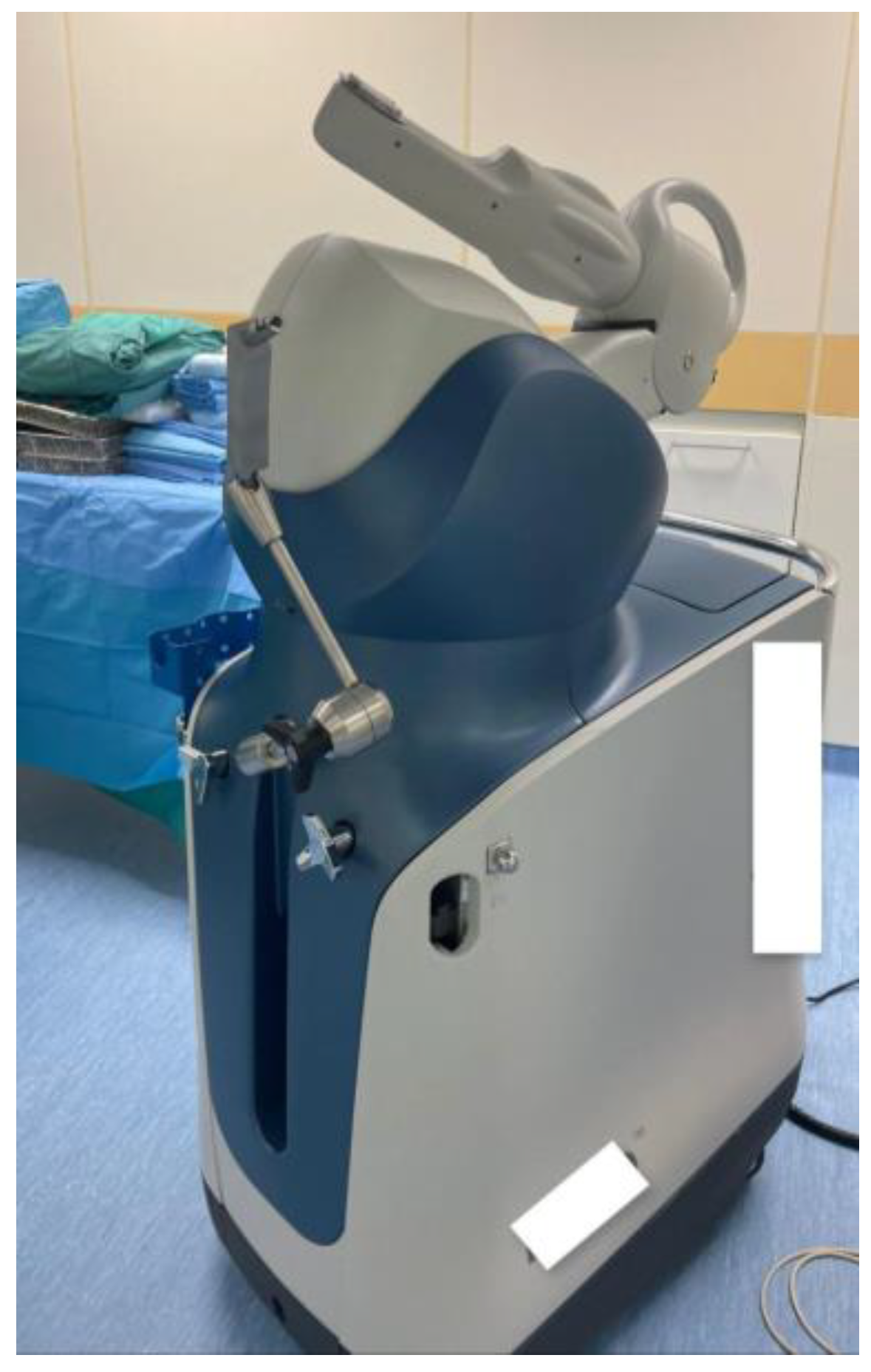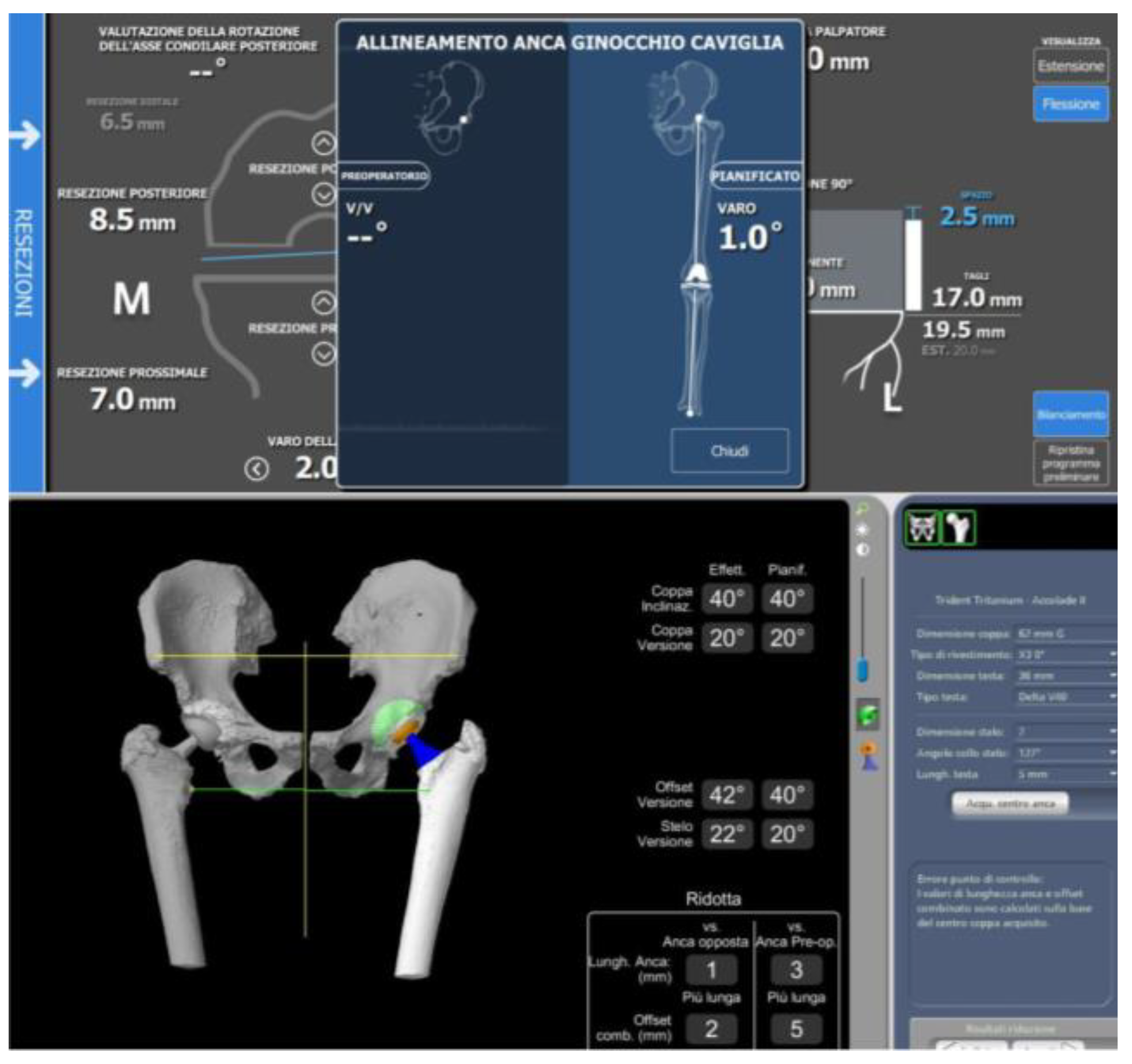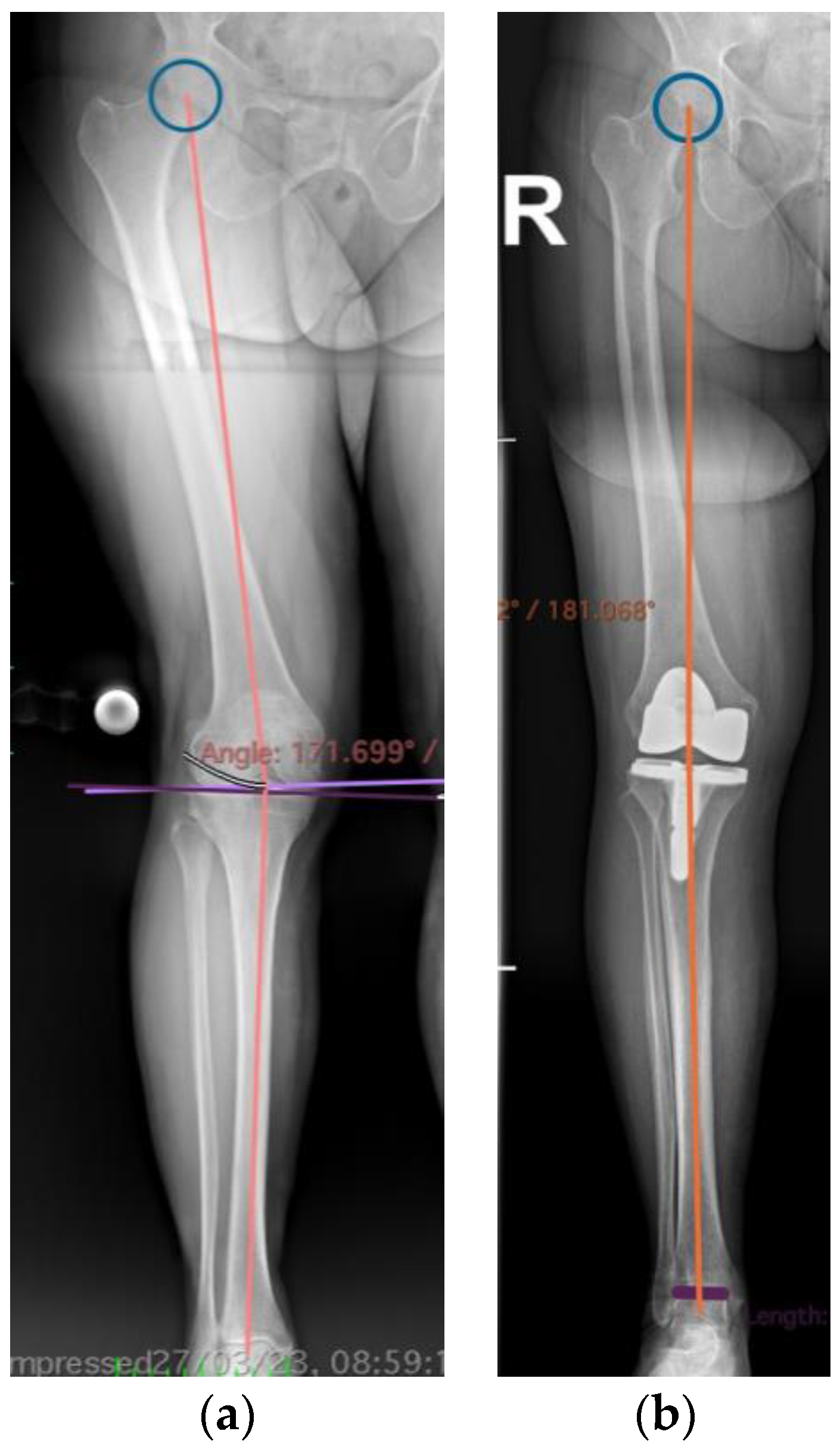Submitted:
22 June 2024
Posted:
24 June 2024
You are already at the latest version
Abstract
Keywords:
1. Introduction
2. Materials and Methods
3. Results
4. Discussion
5. Conclusions
Funding
Conflicts of Interest
References
- Marchand KB, Moody R, Scholl LY, Bhowmik-Stoker M, Taylor KB, Mont MA, Marchand RC. Results of Robotic-Assisted Versus Manual Total Knee Arthroplasty at 2-Year Follow-up. J Knee Surg. 2023 Jan;36(2):159-166. [CrossRef]
- Kim YH, Yoon SH, Park JW. Does Robotic-assisted TKA Result in Better Outcome Scores or Long-Term Survivorship Than Conventional TKA? A Randomized, Controlled Trial. Clin Orthop Relat Res. 2020 Feb;478(2):266-275. [CrossRef]
- Chen X, Xiong J, Wang P, Zhu S, Qi W, Peng H, Yu L, Qian W. Robotic-assisted compared with conventional total hip arthroplasty: systematic review and meta-analysis. Postgrad Med J. 2018 Jun;94(1112):335-341. [CrossRef]
- Marmotti A, Rossi R, Castoldi F, Roveda E, Michielon G, Peretti GM. PRP and articular cartilage: a clinical update. BiomedResInt. 2015;2015:542502. [CrossRef] [PubMed]
- Deckey DG, Rosenow CS, Verhey JT, Brinkman JC, Mayfield CK, Clarke HD, Bingham JS. Robotic-assisted total knee arthroplasty improves accuracy and precision compared to conventional techniques. Bone Joint J. 2021 Jun;103-B(6 Supple A):74-80. [CrossRef]
- Rajan PV, Khlopas A, Klika A, Molloy R, Krebs V, Piuzzi NS. The Cost-Effectiveness of Robotic-Assisted Versus Manual Total knee Arthroplasty: A Markov Model-Based Evaluation. J Am Acad Orthop Surg. 2022 Feb 15;30(4):168-176. [CrossRef]
- Pierce J, Needham K, Adams C, Coppolecchia A, Lavernia C. Robotic-assisted total hip arthroplasty: an economic analysis. J Comp Eff Res. 2021 Nov;10(16):1225-1234. [CrossRef]
- Hossain E, Rana R, Higgins N, Soar J, Barua PD, Pisani AR, Turner K. Natural Language Processing in Electronic Health Records in relation to healthcare decision-making: A systematic review. Comput Biol Med. 2023 Mar;155:106649. [CrossRef] [PubMed]
- Goodman RS, Patrinely JR Jr, Osterman T, Wheless L, Johnson DB. On the cusp: Considering the impact of artificial intelligence language models in healthcare. Med. 2023 Mar 10;4(3):139-140. [CrossRef] [PubMed]
- Shahsavar Y, Choudhury A User Intentions to Use ChatGPT for Self-Diagnosis and Health-Related Purposes: Cross-sectional Survey Study JMIR Hum Factors 2023;10:e47564. [CrossRef]
- Shaikh HJF, Hasan SS, Woo JJ, Lavoie-Gagne O, Long WJ, Ramkumar PN. Exposure to Extended Reality and Artificial Intelligence-Based Manifestations: A Primer on the Future of Hip and Knee Arthroplasty. J Arthroplasty. 2023 Oct;38(10):2096-2104. [CrossRef]
- Andriollo L, Picchi A, Sangaletti R, Perticarini L, Rossi SMP, Logroscino G, Benazzo F. The Role of Artificial Intelligence in Anterior Cruciate Ligament Injuries: Current Concepts and Future Perspectives. Healthcare. 2024; 12(3):300. [CrossRef]
- Fucentese SF, Koch PP. A novel augmented reality-based surgical guidance system for total knee arthroplasty. Arch Orthop Trauma Surg. 2021 Dec;141(12):2227-2233. [CrossRef]
- Fotouhi J, Alexander CP, Unberath M, Taylor G, Lee SC, Fuerst B, Johnson A, Osgood G, Taylor RH, Khanuja H, Armand M, Navab N. Plan in 2-D, execute in 3-D: an augmented reality solution for cup placement in total hip arthroplasty. J Med Imaging (Bellingham). 2018 Apr;5(2):021205. [CrossRef]
- Pokhrel S, Alsadoon A, Prasad PWC, Paul M. A novel augmented reality (AR) scheme for knee replacement surgery by considering cutting error accuracy. Int J Med Robot. 2019 Feb;15(1):e1958. [CrossRef]
- Suarez-Ahedo C, Lopez-Reyes A, Martinez-Armenta C, Martinez-Gomez LE, Martinez-Nava GA, Pineda C, Vanegas-Contla DR, Domb B. Revolutionizing orthopedics: a comprehensive review of robot-assisted surgery, clinical outcomes, and the future of patient care. J Robot Surg. 2023 Aug 28. [CrossRef]
- Brinkman JC, Christopher ZK, Moore ML, Pollock JR, Haglin JM, Bingham JS. Patient Interest in Robotic Total Joint Arthroplasty Is Exponential: A 10-Year Google Trends Analysis. Arthroplast Today. 2022 Mar 24;15:13-18. [CrossRef]
- Griffiths SZ, Albana MF, Bianco LD, Pontes MC, Wu ES. Robotic-Assisted Total Knee Arthroplasty: An Assessment of Content, Quality, and Readability of Available Internet Resources. J Arthroplasty. 2021 Mar;36(3):946-952. [CrossRef]
- Meo SA, Al-Masri AA, Alotaibi M, Meo MZS, Meo MOS. ChatGPT Knowledge Evaluation in Basic and Clinical Medical Sciences: Multiple Choice Question Examination-Based Performance. Healthcare (Basel). 2023 Jul 17;11(14):2046. [CrossRef]
- Van Bulck L, Moons P. What if your patient switches from Dr. Google to Dr. ChatGPT? A vignette-based survey of the trustworthiness, value and danger of ChatGPT-generated responses to health questions. Eur J Cardiovasc Nurs. 2023 Apr 24:zvad038. [CrossRef]
- Hou Y, Yeung J, Xu H, Su C, Wang F, Zhang R. From Answers to Insights: Unveiling the Strengths and Limitations of ChatGPT and Biomedical Knowledge Graphs. Res Sq [Preprint]. 2023 Aug 1:rs.3.rs-3185632. [CrossRef]
- American Academy of Orthopaedic Surgeons. (2014). Total Knee Replacement Exercise Guide. https://orthoinfo.aaos.org/en/recovery/total-knee-replacement-exercise-guide/.
- Nogalo C, Meena A, Abermann E, Fink C. Complications and downsides of the robotic total knee arthroplasty: a systematic review. Knee Surg Sports Traumatol Arthrosc. 2023 Mar;31(3):736-750. [CrossRef]
- Hasan S, Ahmed A, Waheed MA, Saleh ES, Omari A. Transforming Orthopedic Joint Surgeries: The Role of Artificial Intelligence (AI) and Robotics. Cureus. 2023 Aug 10;15(8):e43289. [CrossRef]
- Kienzle A, Niemann M, Meller S, Gwinner C. ChatGPT May Offer an Adequate Substitute for Informed Consent to Patients Prior to Total Knee Arthroplasty-Yet Caution Is Needed. J Pers Med. 2024 Jan 5;14(1):69. [CrossRef]
- Mika AP, Martin JR, Engstrom SM, Polkowski GG, Wilson JM. Assessing ChatGPT Responses to Common Patient Questions Regarding Total Hip Arthroplasty. J Bone Joint Surg Am. 2023 Oct 4;105(19):1519-1526. [CrossRef]
- Yang J, Ardavanis KS, Slack KE, Fernando ND, Della Valle CJ, Hernandez NM. Chat Generative Pre-Trained Transformer (ChatGPT) and Bard: Artificial Intelligence Does Not Yet Provide Clinically Supported Answers for Hip and Knee Osteoarthritis. J Arthroplasty. 2024 Jan 16:S0883-5403(24)00027-5. [CrossRef]
- Walker HL, Ghani S, Kuemmerli C, Nebiker CA, Müller BP, Raptis DA, Staubli SM. Reliability of Medical Information Provided by ChatGPT: Assessment Against Clinical Guidelines and Patient Information Quality Instrument. J Med Internet Res. 2023 Jun 30;25:e47479. [CrossRef]
- Eastin, MS. Credibility assessments of online health information: the effects of source expertise and knowledge of content. J Comp Mediated Commun. 2001;6(4).
- Miller, A. The intrinsically linked future for human and Artificial Intelligence interaction. J Big Data 2019 6, 38. [CrossRef]
- Pirhonen, A. , Silvennoinen, M., & Sillence, E. (2014). Patient Education as an Information System, Healthcare Tool and Interaction. Journal of Information Systems Education, 25(4), 327-332.
- Feng S, Shen Y. ChatGPT and the Future of Medical Education. Acad Med. 2023 Aug 1;98(8):867-868. [CrossRef]



| HIP | KNEE |
|---|---|
|
|
| Accuracy | Completeness | ||||
| Hip | Knee | Hip | Knee | ||
| Surgeon 1 | t1 | 4.4 (0.94) | 4.65 (0.59) | 1.95 (0.39) | 2 (0.32) |
| t2 | 4.4 (0.94) | 4.65 (0.59) | 1.95 (0.39) | 2 (0.32) | |
| Within surgeon p | 1 | 1 | 1 | 1 | |
| Surgeon 2 | t1 | 4.3 (0.92) | 4.5 (0.61) | 2.15 (0.42) | 2.05 (0.39) |
| t2 | 4.4 (0.94) | 4.65 (0.59) | 2. (0.32) | 2.1 (0.45) | |
| within surgeon p | 0.35 | 0.15 | 0.23 | 0.77 | |
| Surgeon 3 | t1 | 4.3 (0.86) | 4.65 (0.59) | 2.05 (0.51) | 2.1 (0.45) |
| t2 | 4.4 (0.82) | 4.5 (0.61) | 2.05 (0.39) | 2.15 (0.37) | |
| within surgeon p | 0.35 | 0.15 | 1 | 0.77 | |
| Between surgeon p | t1 | 1 | 1 | 0.49 | 1 |
| t2 | 1 | 1 | 1 | 0.56 | |
Disclaimer/Publisher’s Note: The statements, opinions and data contained in all publications are solely those of the individual author(s) and contributor(s) and not of MDPI and/or the editor(s). MDPI and/or the editor(s) disclaim responsibility for any injury to people or property resulting from any ideas, methods, instructions or products referred to in the content. |
© 2024 by the authors. Licensee MDPI, Basel, Switzerland. This article is an open access article distributed under the terms and conditions of the Creative Commons Attribution (CC BY) license (http://creativecommons.org/licenses/by/4.0/).





